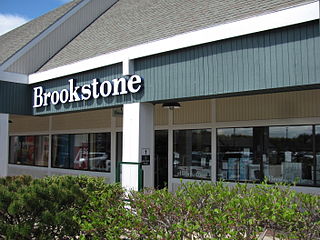Mervyn's was an American middle-scale department store chain based in Hayward, California, and founded by Mervin G. Morris (1920–2021). It carried national brands of clothing, footwear, bedding, bath products, furniture, jewelry, beauty products, electronics, toys, and housewares. Many of the company's stores were opened in shopping malls; however, some locations were operated independently. Based on 2005 revenue, Mervyn's was the 83rd largest retailer in the United States.

The Great Atlantic & Pacific Tea Company, better known as A&P, was an American chain of grocery stores that operated from 1859 to 2015. From 1915 through 1975, A&P was the largest grocery retailer in the United States.

Eastern Mountain Sports is an outdoor clothing and equipment retailer in the Northeastern United States headquartered in Meriden, Connecticut.
Venture Stores, Inc. was a chain of retail stores aimed at the discount department-store market. John Geisse, formerly of Target Stores, and May Department Stores' executive vice president, Dave Babcock, founded the chain in 1968. Venture Stores expanded to operate over 70 stores with major market share in St. Louis, Chicago, and Kansas City, and expanded across various areas in the United States over a period of nearly 30 years, becoming the largest discount chain in Chicago. In January 1998, Venture Stores entered a Chapter 11 bankruptcy and closed within six months.

Caldor, Inc. was a discount department store chain founded in 1951 by husband and wife Carl and Dorothy Bennett. Referred to by many as "the Bloomingdale's of discounting," Caldor grew from a second story "Walk-Up-&-Save" operation in Port Chester, New York, into a regional retailing giant. Its stores were earning over $1 billion in sales by the time Carl Bennett retired in 1985, by which time Caldor was a subsidiary of Associated Dry Goods.
Bradlees Department Store, more commonly known as Bradlees, was a discount department store chain based in Braintree, Massachusetts, which operated primarily in the Northeastern United States. Bradlees sold various retail items in its stores, including clothing, jewelry, health care, beauty products, footwear, furniture, electronics, housewares, and bedding. At its peak in the 1990s, Bradlees operated over 105 stores in seven states across the Northeast, with close to 10,000 employees. Along with being a part of Stop & Shop from 1961 until 1992, the chain went through Chapter 7 bankruptcy in 2000, with all of its stores eventually closing by March 15, 2001.

McCrory Stores or J.G. McCrory's was a chain of five and dime stores in the United States based in York, Pennsylvania. The stores typically sold shoes, clothing, housewares, fabrics, penny candy, toys, cosmetics, and often included a lunch counter or snack bar.

Zayre was a chain of discount stores that operated in the eastern half of the United States from 1956 to 1990. The company's headquarters were in Framingham, Massachusetts. In October 1988, Zayre's parent company, Zayre Corp., sold the stores to the competing Ames Department Stores, Inc. chain. In June 1989, Zayre Corp. merged with one of its subsidiaries, The TJX Companies, parent company of T.J. Maxx, which still exists today. A number of stores retained the Zayre name until 1990, by which time all stores were either closed or converted into Ames stores.
H. C. Prange Co., sometimes shortened to Prange's, was an American department store chain begun by H. C. Prange in 1887 in Sheboygan, Wisconsin. At its peak, it operated stores in the states of Wisconsin, Illinois, and Michigan. It also operated discount stores under the Prange Way name in the former two states, although this division was sold off in the 1990s. Prange's was dissolved and most of the stores converted to the rival Younkers chain after sale in 1992.
Ernst Home Centers, Inc. was a chain of home improvement retail stores founded in Seattle, Washington, United States. Ernst was started in 1893 by Seattle brothers Charles and Fred Ernst. In 1960, it became a division of Pay 'n Save, one of the largest retail companies in the Northwest. After a 1984 takeover of Pay 'n Save, Ernst was sold off and went public in 1994. Following several highly publicized lawsuits and a failed attempt to open larger stores, the company filed for Chapter 11 bankruptcy in 1996 and liquidated in early 1997. At the company's peak, it operated 95 stores in 12 western U.S. states.

David's Bridal is a clothier in the United States that specializes in wedding dresses, bridesmaid dresses, prom and homecoming dresses, quinceañera dresses, flower girl dresses, other formal wear, and alterations. Until filing for bankruptcy in 2023, David's Bridal operated 298 stores in 49 states, Canada, and the United Kingdom, making it the largest American bridal-store chain It sold 25-30% of all wedding dresses purchased in the United States.
K·B Toys was an American chain of mall-based retail toy stores. The company was founded in 1922 as Kaufman Brothers, a wholesale candy store. The company opened a wholesale toy store in 1946, and ended its candy wholesales two years later to emphasize its toy products. Retail sales began during the 1970s, using the name Kay-Bee Toy & Hobby.
Phar-Mor was a United States chain of discount drug stores, based in Youngstown, Ohio, and founded by Michael "Mickey" Monus and David Shapira in 1982. Some of its stores used the names Pharmhouse and Rx Place. Low prices were advertised to bring in a large volume of sales with the slogans "Phar-Mor power buying gives you Phar-Mor buying power" and "Phar-Mor For Less." Another common slogan in their TV commercials was "Power buying saves: Save at Phar-Mor."

Brookstone is a chain of retail stores in the United States and China. It was founded as a mail-order business in 1965, when it started selling items, such as dental clamps and other specialty tools. Its first physical location opened in 1973 in Peterborough, New Hampshire. The company's headquarters are currently located in Merrimack, New Hampshire.
Loehmann's was an American retail company which started as a single store in Brooklyn, New York and grew to a chain of off-price department stores in the United States. The chain was best known for its "Back Room", where women interested in fashion could find designer clothes at prices lower than in department stores. While the largest portion of its client base was historically women, the chain also offered shoes, accessories, and men's clothing.
Filene's Basement, also called The Basement, was a Massachusetts-based chain of department stores which was owned by Retail Ventures, Inc. until April 2009 when it was sold to Syms.

Christmas Tree Shops was an American chain of big-box specialty retail stores, headquartered in Middleborough, Massachusetts. At its peak, the chain operated 72 stores in 20 U.S. states, primarily in the Northeast. The company filed for bankruptcy in 2023 and closed all of its stores by August 12, 2023, officially ending its 53-year legacy.

Bob's Stores was a chain of retail stores in the northeastern United States owned by GoDigital Media Group. Founded as Bob's Surplus in Middletown, Connecticut, by Robert "Bob" Lapidus in 1954, the chain expanded gradually until it was acquired by Melville Corporation and has been reacquired five more times since then. The chain targets moderate-income customers with a selection of footwear, workwear, teamwear, and activewear.
Sears Holdings Corporation was an American holding company headquartered in Hoffman Estates, Illinois. It was the parent company of the chain stores Kmart and Sears and was founded after the former purchased the latter in 2005. It was the 20th-largest retailing company in the United States in 2015. It filed for Chapter 11 bankruptcy on October 15, 2018, and sold its assets to ESL Investments in 2019. The new owner moved Sears assets to its newly formed subsidiary Transformco.








